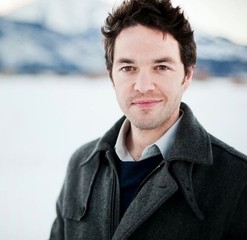|
Back
Amazing Grace New York
Avery Fisher Hall, Lincoln Center
06/18/2014 - & June 19, 20, 21, 2014
Ludwig van Beethoven: Piano Concertos No. 2 in B-flat Major, Opus 15, & No. 3 in C minor, Opus 37
Sean Shepherd: Songs (World Premiere)
Yefim Bronfman (Pianist)
New Yok Philharmonic Orchestra, Alan Gilbert (Music Director/Conductor)

S. Shepherd (© Jamie Kingham)
Interviewing a very famous actor once, with little response, I asked him to give me, in a single word, the one attribute without which no actor could survive. He looked up for the first time, actually took interest in the question, and answered directly.
“Grace,” he said. “Anybody on stage or in films must have their own grace. Otherwise they won’t survive.”
I was thinking of this during one of the two absolutely euphoric moments in this, the second of the Beethoven concerto series, by Yefim Bronfman. Some tend to put down the Second Concerto (actually composed before the “First”), feeling it was too Classical, too Mozartean. Perhaps that is true. But when Mr. Bronfman entered in the opening movement, one felt not so much his power as this ultimate grace in his playing. The word effortless is probably an insult to the pianist, but the man’s fingers rolled like the purest water over the opening, through the lyric second theme, and then played Beethoven’s cadenza with all the display necessary.
For some reason, Mr. Gilbert took the Adagio at a relatively rapid pace, as if he wanted to get to the bumptious finale. Here too, it was Mr. Bronfman simply enjoying himself, enjoying his music. The music is Beethoven feeling good and confident., and the pianist played it with that same aplomb.
The second gorgeous moment was performed with a grandeur befitting its music. If Mr. Bronfman instinctively reverted to the aristocratic 18th Century for the Second Concerto, here he was aiming an ideal of the Age of Napoleon, with unparalleled emotion. The cadenza, that open-ended canonic introduction led to a hammer and tongs performance, the first time in the evening, a truly massive sound. Not so much in volume as in texture, a body of music which stood out for itself, as if he didn’t need the Philharmonic at all.
Applause between movements, while traditional until a few decades ago, is verboten these days. But some in the audience couldn’t hold back, and most of us others forgave them this spontaneous laudation.
The Largo was again a grand solo, and Mr. Bronfman performed as though he was improvising. Those gorgeous arpeggios, the turns of phrase, the attention to those little fugues, and the jovial Beethoven ending were splendid indeed.
With the Beethoven Concerto Festival, the New York Philharmonic has commissioned two works by two young composers, and Songs by Sean Shepherd made its mark. Last week’s commission by Anthony Cheung I felt was opaque, dense, too clever by half. Mr. Shepherd’s seven-sectioned work was orchestrally diaphanous, and structurally a resplendent game for us all.
The “songs” were not sung, but were reminiscent, supposedly, of seven places: “The Fair”, “The Chapel”, “The Cradle”, “The Cavern”, “The Nursery”, “The Courtyard” and “The Meadow”.
Since the work began with chapel bells in the celesta and tubular bells, one would have thought “The Chapel” had superseded “The Fair”. But one didn’t notice that, for each of the non-linear songs was given its own atmosphere, its own orchestral solos (Glenn Dicterow’s solo must have made Mr. Shepherd proud), with the tintinnabulations of celesta, cymbals, cowbells, tambourines, harp and tubular bells. Mr Shepherd paid great attention to his percussion, using each instrument prudently to provide both background and, sometimes, “song” for Songs.
He mentioned that this was a palindromic piece, and yes, that same celesta and a variant of the first theme came at the end. Fifteen minutes was all too short for this work, dazzling with light, sparkle and invention.
Harry Rolnick
|